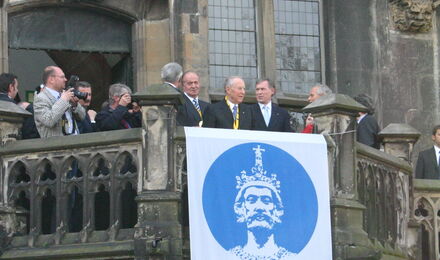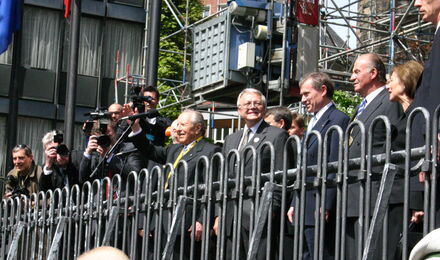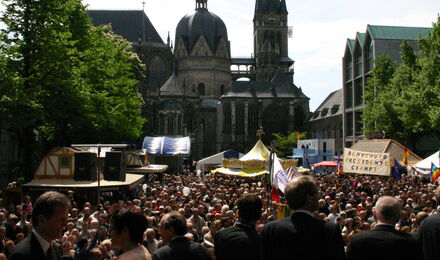Award of the International Charlemagne Prize of Aachen to the President of the Italian Republic, Dr Dr Carlo Azeglio Ciampi:
The European idea is inconceivable without the deeply felt yearning for peace of the people. And it is equally inconceivable without the awareness of a common European intellectual heritage. The system of values that we hold to, respect for human dignity and civil rights, solidarity and social justice, are rooted in centuries of shared cultural tradition and intellectual history. The preservation of a core set of values and standards rooted in this tradition is essential to the preservation of peace and freedom, tolerance and open-mindedness in a United Europe.
To shape a European policy of this kind, there was and is a need for pragmatic and visionary leaders who inextricably link the interests of their country with the goals of a united Europe, who build a bridge between the old and the new, whose enthusiasm for integration is infectious, who by their presence create a climate of trust and community and who repeatedly promote and sharpen awareness of the necessity of European unification on the basis of shared values.
In honour of his outstanding life's work, the Board of Directors of the Society for the Conferring of the International Charlemagne Prize of Aachen honours the President of the Italian Republic, Dr. Dr. Carlo Ciampi, who has always dedicated his political work to the progress of European integration and who, in the best tradition of the Charlemagne Prize winners Alcide de Gasperi, Antonio Segni and Emilio Colombo, stands like few others for an Italy that is tolerant as well as value-based, that is both cosmopolitan and deeply European, as a co-founder and cornerstone of the European Union.
‘European integration is in the process of expanding from an economic and monetary one into a genuine bond of democratic solidarity. This process requires a European constitution: it is necessary to demonstrate that the ultimate source of the legitimacy of the institutions of the European Union lies with the citizens; it is necessary because there can be no European identity without full acceptance of values including the fight against xenophobia and respect for minorities; it is necessary to allow the fundamental values of democracy and freedom to radiate beyond the borders of the European Union, into the geophysical area of Europe.
We can already define the two decisive core ideas of the European constitution: the first part of it will incorporate the content of the Charter of Fundamental Rights; the second part will define the spheres of competences and responsibilities not only for the Union's organs, but also for the institutional subjects (from the municipalities to the regions to the states) that participate in European community life.’ (Speech given on the occasion of being awarded an honorary doctorate by the University of Leipzig on 6 July 2000)
With these words, Carlo Ciampi placed himself at the forefront of those who wanted to shape Europe not only through individual policies, but rather within the framework of a comprehensive overall concept for the Union. He, who is considered to be one of the architects of the European Central Bank and the Stability and Growth Pact, was always convinced that Europe should not limit itself to monetary union, but should rather see this monetary union as an important building block of a supranational constitution. In 2002, when the EURO was awarded the International Charlemagne Prize of Aachen, he used the occasion to make an urgent appeal to define the introduction of the common currency not only as a goal but also as a starting point for further integration efforts:
‘It is in the logic of the construction process of a united Europe that each advance demands further advances: either you move forward or you jeopardise what has been achieved. [...] Since the beginning of the studies and debates that led to the creation of the euro, it was clear that the good functioning of the new monetary system would require strong coordination of the economic policies of the member states. [...] In the near future, the unified leadership of foreign and defence policy must be strengthened without further delay; within a new treaty, a unified area of freedom, security and justice must be consolidated and expanded. Those who doubt this new progress should not forget that the progress already made always seemed just as utopian.’
Carlo Azeglio Ciampi was born in Livorno on 9 December 1920, the son of an optician, and also grew up there. From 1937 to 1941 he studied at the University of Pisa, ‘Scuola Normale’. During that time, he travelled to Germany twice to learn German: once in the summer of 1939 in Bonn and again in Leipzig in 1940/41. In May 1941, he passed his state examination with a thesis on Greek literature. In mid-1941, he was drafted into military service. In 1946, he passed the state examination in law with a thesis on religious minorities in Italy. Shortly afterwards, he joined the Banca d'Italia, where he remained loyal until 1993.
After holding various senior positions, in which he earned an excellent international reputation as a first-class theorist and incorruptible practitioner, he was appointed Director General in 1978, making him the ‘second man’ behind central bank governor Baffi. In October 1979, Ciampi finally took over the office of governor himself and subsequently represented Italy in numerous international banking committees. Domestically, the currency guardian – following the German example and anticipating European developments – achieved the separation of the central bank from the Italian Treasury; he also ensured that the lira was classified in the European Monetary System (EMS) as a currency with a two-percent fluctuation band.
Although Ciampi always remained diplomatically reserved in his comments on current politics, he was one of the most vocal critics of the old Italian party system. It is therefore no wonder that in the wake of the far-reaching changes in the Italian state and party structure at the beginning of the 1990s, the choice fell on the independent Ciampi, who was highly regarded internationally, when, after the resignation of the Amato government, no representative of the ‘long-serving’ political guard was considered for the position of head of government. On 29 April 1993, Ciampi, who had always been known for his competence, independence and discretion, was sworn in as the new Prime Minister; as expected, he included a large number of non-partisan experts in his government.
After setting the course for an upturn in the Italian economy by, among other things, implementing large-scale privatisation measures, he used a motion of no confidence as an opportunity to resign in January 1994, paving the way for the first parliamentary elections under the new electoral law. After the victory of the conservative alliance under the leadership of Silvio Berlusconi, Ciampi took up the post of deputy chairman of the Bank for International Settlements in July 1994. He also took over the chairmanship of a commission of experts named after him, which critically examined the competitive opportunities of the European economy in two reports.
In May 1996, Ciampi returned to politics at the request of the surprise winner of the early parliamentary elections in April 1996, Romano Prodi, and took over responsibility for the Treasury and Budget Ministry. With a rigid stability course, Ciampi was able to sustainably reduce Italy's budget deficit, inflation rate and debt ratio. At the end of April 1998, the founding member of the European Community was officially accepted into the circle of EURO members.
Previously, the proven finance expert, who had already played a major role in drafting the statute of a politically independent European Central Bank, had ensured the adoption of the Stability and Growth Pact together with his German counterpart Theo Waigel and the Luxembourg Prime Minister Jean-Claude Juncker.
Dr Dr Carlo Ciampi was finally elected Italian President in May 1999, succeeding Oscar Luigi Scalfaro. All the major parties had agreed on his person, and he received an overwhelming majority in the first ballot in the electoral assembly. Since then, the convinced European has repeatedly addressed the pressing issues for the future of the Union and has strongly advocated rapid progress in the integration process, both in the EU member states and with his own Italian government.
However, in Europe nothing can ever be the same again. The contradictions on our continent cannot be overcome if we swear by a common foreign policy with our right hand while preventing it from working with our left. We cannot resolve our contradictions if we do not have the courage to understand that systems based solely on the interplay of alliances and national self-interest have guaranteed only short-lived peace in the past, peace that has then ended in horrific conflicts. The danger of latent nationalism is always present, by the way. Overcoming national perspectives, consolidating a system of shared sovereignty, and complying with the existing rules will complete the Union. A unified system of institutions is the only way to ensure that Europe moves forward.’
Carlo Ciampi has already received high honours for his services; he is a Grand Officer of the Order of Merit of the Italian Republic (1974) and has received, among other things, the Grand Cross of the Order of Merit of the Federal Republic of Germany (1986). He has been married to Franca Pilla for over 50 years, and she is considered an important advisor to her husband. The couple has two children.
In 2005, the Board of Directors of the Society for the Conferring of the International Charlemagne Prize of Aachen honours in the person of the President of the Italian Republic, Dr. Dr. Carlo Ciampi, a great statesman and tireless mentor of Europe. He stands for democratic Italy, the Europe of values and the great success story of the Community from the Treaties of Rome to the Constitutional Treaty, which was signed once again in Rome and is closely associated with his work. Carlo Ciampi stands for internal order and for the European fundamental rights of liberty, democracy, tolerance, and openness to the world, as well as secularisation. As an advocate of a European identity – with political, cultural and geographical boundaries – he stands against arbitrariness. And as a mediator between the worlds, he stands for the dialogue of civilisations, in particular also for cooperation with the Arab world.












